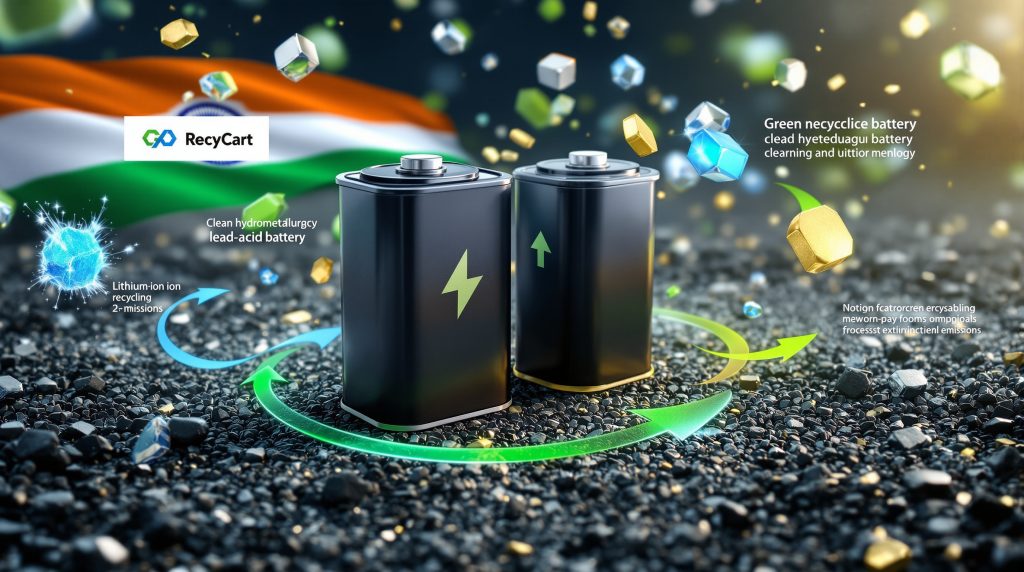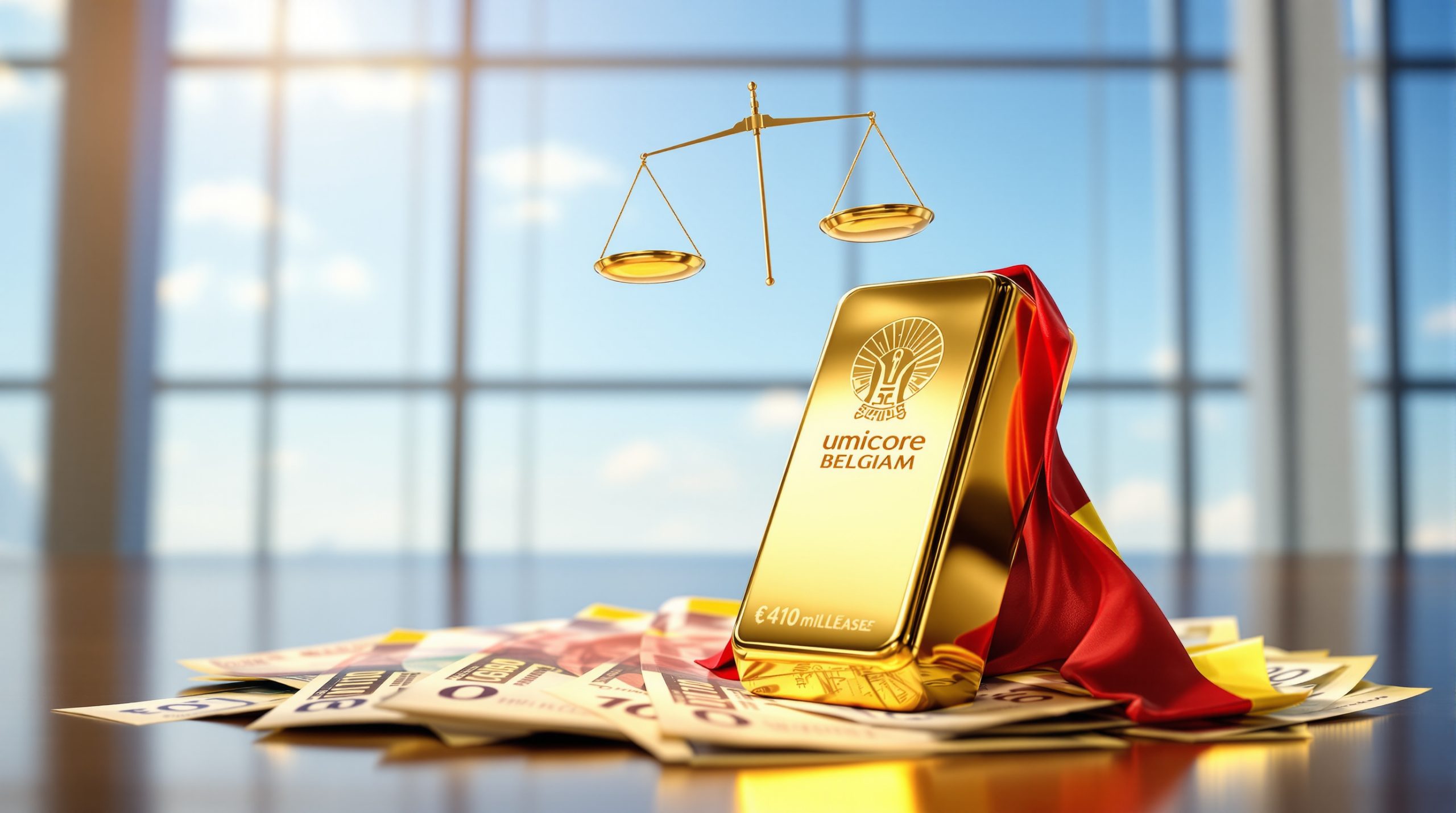What Drives POCL's Strategic Investment in Green Battery Recycling?
POCL's recent investment of just over $500,000 in ACE Green Recycling marks a significant turning point for the company, signaling a dedicated move toward environmental stewardship and the rising global demand for clean energy solutions. This strategic move supports POCL's ambition to move beyond conventional lead smelting operations and become a pivotal player in the field of sustainable battery recycling—specifically for lead-acid and lithium batteries used in electric vehicles (EVs).
Breaking Down the $500,000 Investment Strategy
-
Investment Amount: Just over $500,000 USD
-
Filing Date: October 1, 2025 (National Stock Exchange of India)
-
POCL's Core Business: One of Asia's largest lead smelter operators, with over 130,000 tonnes of annual production capacity
-
Purpose: Penetrate into the business of recycling both lead and lithium batteries, aligning with India's green mobility and electrification goals
Transitioning from Traditional Lead Smelting to Sustainable Recycling
POCL's longtime focus on primary and secondary lead smelting has driven it to a leading position in Asia. However, the environmental impact of conventional lead smelters and societal pressure for cleaner operations have influenced POCL to reimagine its business model. Battery recycling, particularly through green, zero-emission technologies, presents a dual opportunity: capturing new revenue streams and supporting India's clean energy targets.
How This Investment Aligns with India's Green Energy Goals
India's government has launched several policies encouraging EV adoption and battery recycling to reduce environmental harm and boost material self-sufficiency. POCL's investment addresses three critical areas:
-
Reduces reliance on imported raw materials for batteries
-
Encourages domestic supply chain resilience
-
Promotes the formalization and modernization of battery recycling processes
How Does the POCL-ACE Green Partnership Transform Battery Recycling?
The POCL-ACE Green alliance is re-shaping battery recycling in the region through advanced, emission-free methods and technological upgrades.
Zero-Emission Hydrometallurgical Technology Explained
ACE Green employs a hydrometallurgical process that replaces energy-intensive, high-temperature smelting with chemical-based extraction at room temperature. This results in:
-
No direct greenhouse gas emissions
-
Reduced energy consumption
-
Elimination of toxic byproducts typically associated with pyrometallurgy
Comparing Traditional vs. Green Recycling Methods
| Feature | Traditional Smelting | Hydrometallurgical Recycling |
|---|---|---|
| Typical Operating Temp. | 1,000°C+ | Room Temperature |
| Greenhouse Gas Emissions | High | Virtually Zero |
| Energy Consumption | High | Low |
| Toxic Byproducts | Significant | Minimal/None |
| Metal Recovery Rate | High | Comparable or Higher |
Projected Environmental Impact of the Partnership
By scaling green battery recycling technology, the partnership expects significant environmental gains:
-
Lower carbon footprint for every tonne of battery recycled
-
Safer working conditions due to minimal toxic emissions
-
Supporting India's goal to formalize recycling and end unsafe informal practices
Why is ACE Green Focusing on LFP Battery Recycling?
ACE Green is strategically channeling its resources into lithium iron phosphate (LFP) battery recycling, a segment set for rapid growth as adoption rises among automotive OEMs.
Market Analysis: LFP vs. NCM Battery Trends
| Battery Type | Main Metals | Key Markets | Market Trend |
|---|---|---|---|
| LFP | Lithium, Iron, Phosphate | EVs, Energy Storage | Rapid Growth |
| NCM | Nickel, Cobalt, Manganese, Lithium | EVs | Growth slowing in favor of LFP |
Industry data indicates LFP batteries are rapidly gaining global EV market share due to their safety, cost-effectiveness, and abundant raw material base.
CEO Insights: LFP as the EV Battery of the Future
ACE Green's leadership has emphasized LFP as the dominant chemistries for next-generation EV batteries. With many competing for NCM recycling market share amid declining demand for cobalt- and nickel-rich chemistries, LFP offers an uncluttered competitive landscape and aligns with Tesla, BYD, and other global firms pivoting to LFP systems.
Competitive Advantage in an Emerging Market Segment
-
Lower competition for LFP recycling compared to NCM
-
Positioned to capitalize on LFP's projected dominance in EVs and stationary storage
-
Proprietary technology adaptable for evolving battery formulations
What Global Expansion Strategies is ACE Green Pursuing?
ACE Green's expansion plan targets multiple global markets through facility launches and international partnerships.
New Facilities in Mundra, India: Strategic Importance
The newest recycling plant, located in the port city of Mundra, is focused on LFP batteries. The strategic location provides:
-
Easy access for both inbound battery scrap and outbound recovered materials
-
Connectivity to automotive manufacturing hubs and export markets
-
Support for local job creation and skills development
African Partnership with Spiro: Recycling Across Continents
ACE Green has partnered with Spiro, a key African EV battery manufacturer, to aggregate and process spent EV batteries across the continent. This cross-regional initiative:
-
Expands feedstock supply and market reach
-
Strengthens presence in regions with rapidly growing electrification
-
Supports sustainable economic development abroad
US Operations and Technology Advancements
In Houston, ACE Green has recently incorporated systems capable of direct recovery of valuable alloy metals like antimony and tin, enhancing circular recovery and further reducing waste. This innovation underlines the firm's commitment to technological leadership in advanced battery recycling breakthrough.
How Efficient is Lead Battery Recycling Compared to Other Materials?
Lead-acid batteries stand as one of the most recycled consumer products—both in the US and globally.
The 99% Recycling Rate: Breaking Down the Numbers
-
US lead battery recycling rate: **99%**—the highest of any consumer product
-
Recycled content in new lead batteries: At least 80%
-
All components recyclable: Lead, plastic, and acid
Component Recovery: Lead, Plastic, and Acid Reuse
Each part of a lead-acid battery is efficiently recovered:
-
Lead: Re-smelted into fresh battery grids and components
-
Plastic: Molded into new battery cases
-
Acid: Neutralized for safe disposal or converted into useful chemicals
Comparison Table: Recycling Rates Across Battery Types
| Battery Type | Recycling Rate (US) | Typical Recycled Content | Main Recovery Challenge |
|---|---|---|---|
| Lead-Acid | 99% | 80%+ | Informal sector leakage |
| Lithium-Ion | ~5–20% (varies) | 0–20% | Chemistry complexity |
| Alkaline | ~50% | Low | Collection logistics |
What Challenges Does India's Battery Recycling Sector Face?
Despite advancements in technology and formal sector capabilities, India's battery recycling sector faces major hurdles.
The Informal Sector: Processing 30% of Used Lead Batteries
Estimates show about 30% of India's spent lead batteries are handled by informal recyclers lacking environmental and safety controls. This percentage represents a substantial flow of hazardous material outside formal oversight.
Environmental and Health Impacts of Unregulated Recycling
Key risks from the informal sector:
-
Uncontrolled emissions of lead dust and acid fumes
-
Contamination of soil and water bodies
-
Severe health consequences for workers and local communities
Warning:
Informal recycling operations frequently expose workers—including children—to dangerous toxins, resulting in disproportionate health risks and significant environmental damage.
Regulatory Framework and Implementation Gaps
India has adopted policies mandating licensed recycling and extended producer responsibility (EPR) for battery makers. Challenges persist, however:
-
Enforcement gaps enable informal operators to thrive
-
Limited investment in formal collection and processing infrastructure
-
Traceability issues hinder accountability for spent batteries
How Will This Partnership Impact the Circular Economy for Batteries?
POCL's investment in ACE Green Recycling is a major step toward a practical circular economy model in battery materials. By capturing more value from waste streams and minimizing imports of primary raw materials, the initiative:
Material Recovery and Supply Chain Resilience
-
Recovers lead, lithium, antimony, tin, and plastics for recirculation
-
Lowers raw material imports and dependency on volatile global prices
-
Increases supply chain stability for India's battery sector
Economic Benefits: Job Creation and Value Recovery
-
Direct creation of skilled jobs in plant operations and management
-
Secondary jobs in collection, logistics, and related sectors
-
Adds value to the economy by keeping raw materials in-country
Case Study: Successful Circular Economy Models in Battery Recycling
Lead-acid batteries already exemplify circular economy principles, with mature systems in North America and Europe:
-
High formal sector collection rates
-
Full component reintegration into new batteries
-
Seamless traceability throughout the recycling chain
The POCL and ACE Green collaboration aims to replicate and surpass these achievements for both lead and lithium batteries in India.
What Future Developments Can We Expect from This Collaboration?
The initial $500,000 POCL investment in ACE Green Recycling opens multiple avenues for technological and market expansion.
Scaling Potential: Beyond the Initial Investment
The partnership is likely to scale up rapidly as battery demand rises:
-
Expansion of facility capacities
-
Diversification into new battery chemistries as markets evolve
-
Collaborative ventures with automotive OEMs for integrated battery recycling solutions
Technology Transfer Opportunities in Global Markets
ACE Green's modular, zero-emission recycling platforms are deployable in emerging markets facing similar environmental and resource challenges, opening doors for future licensing or joint venture models across Africa, Southeast Asia, and Latin America.
Integration with EV Manufacturing Ecosystems
There is potential for vertical integration with battery manufacturers and automotive OEMs, enabling:
-
Closed-loop supply chains for critical minerals transition
-
Seamless compliance with environmental regulations and EPR mandates
-
Rapid response to shifts in end-of-life battery flow and regulatory pressures
FAQ: Understanding POCL's Investment in ACE Green Recycling
What technologies make ACE Green's approach innovative?
ACE Green utilizes a zero-emission hydrometallurgical process, enabling high recovery of critical metals without the need for high-temperature smelting or toxic emissions. Their modular facilities allow flexible scaling for various market demands.
How does this investment affect POCL's business model?
The POCL investment in ACE Green Recycling launches the company into the formal battery recycling sector, diversifying revenue streams and securing long-term competitiveness as conventional smelting is increasingly phased out worldwide.
What environmental benefits will result from this partnership?
-
Elimination of smelting-related GHG emissions
-
Substantial decrease in toxic byproduct generation
-
Higher rates of safe, formal battery processing
-
Conservation of non-renewable primary resources
How might this influence global battery recycling standards?
By demonstrating scalable, emission-free recycling models and supplying responsibly sourced materials, the partnership could set new industry benchmarks, influence international policy, and encourage adoption of renewable energy solutions worldwide.
Disclaimer:
All projections and forward-looking statements in this article are for informational and educational purposes only. Business, regulatory, or market shifts could affect actual outcomes. Readers should consult industry experts or financial advisors before making investment decisions based on this analysis.
Further Exploration:
For more on mining industry evolution and battery recycling technology trends, explore Pondy Oxides' latest innovative recycling project for detailed insights on the industry's sustainable future.
Want to Discover the Next Major Mineral Find Before the Market?
Discovery Alert's proprietary Discovery IQ model delivers real-time notifications on significant ASX mineral discoveries, transforming complex data into actionable investment insights. Explore why historic discoveries generate substantial returns by visiting Discovery Alert's dedicated discoveries page and begin your 30-day free trial today to secure your market-leading advantage.




